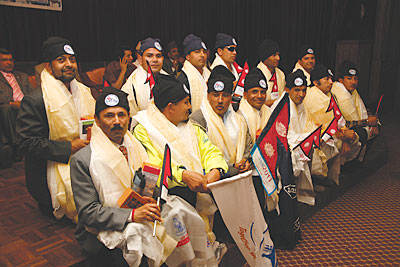 MIN RATNA BAJRACHARYA |
On a stormy day on the top of the world back in 1996, eight climbers lost their lives. The story of how a lifetime's dream for some (and a lucrative business for others) went horribly wrong has been ably recounted by Jon Krakauer in 'Into Thin Air'. His bestseller, unlike many other mountaineering accounts that focus on the pioneering exploits of elite climbers, charted the folly and plain bad luck of rival expeditions pushing to get their clients to the top of Everest. In common with the likes of 'Annapurna' and 'Touching the Void' however, Krakauer's book highlighted the perils involved in high-altitude climbing for even the fittest and most determined people on the planet.
'Into Thin Air' would have brought many amateur climbers and would-be Everest summiteers back down to earth: for a while the idea faltered that anyone could 'conquer' the highest mountain on the planet, courtesy a little training, a lot of cash, and an experienced support crew. But clearly the lesson has not been learnt closer at home. When 15 civil servants (pictured above) announced their plans to scale Everest as part of Nepal Tourism Year 2011, I laughed at their audacity, until I realised this exercise was to cost the state exchequer Rs 30 million. When former foreign minister and octogenarian Shailendra Nath Upadhyay threw his glove into the ring for title of oldest Everest summiteer, I shook my head in disbelief.
Upadhyay perished on the mountain in early May. This would have sent shivers deep into the paunches of our brave civil servants who, unlike the ill-fated Upadhyay, had not ventured beyond the altitude of 5,500 metres prior to this expedition. But as Republica reported without a trace of irony, they were 'dead set about scaling the mountain.' Thankfully, another tragedy was avoided; though six turned back, the remainder reached the summit of Everest Wednesday morning.
Congratulations aside, the real issue here is just why these men were allowed to assert their masculinity at our expense. Yes, the image of civil servants needs to be dusted off world-wide, and nowhere more so in Nepal, where they are not only seen as pen-pushers but corrupt and inept ones at that. Doubtless the leader of the expedition, newly appointed Home Secretary Lila Mani Poudel, was seeking to follow up on his headline-grabbing tirades against corruption last year. But shouldn't the tarnished image of civil servants be burnished by getting them to wield their pens with more alacrity? Should a cricketer lambasted for the poor quality of his play sit down and write a play to prove himself or should he get back in the nets?
It's hardly a surprise that the civil servants concerned participated in such a glorious junket. But whoever signed off on such a wasteful and pointless endeavour should be called to account. Was the point to inspire civil servants all across the nation to begin scrambling up mountains, or was it to get civil servants from all across the world scrambling into Nepal and up our mountains? One can't help but think civil servants committed to serving tourists better would do more for Nepal Tourism Year 2011 than civil servants committed to being tourists. What's more, to address another of the rationales behind the trip, you don't need to go further than Base Camp to 'understand' climate change; anywhere above that you are probably more concerned about altitude change. As far as I can see from 1,350 metres above sea level, this was a stupid stunt, conceived by an idiot, full of sound and fury, signifying nothing. And we're all paying for it.



